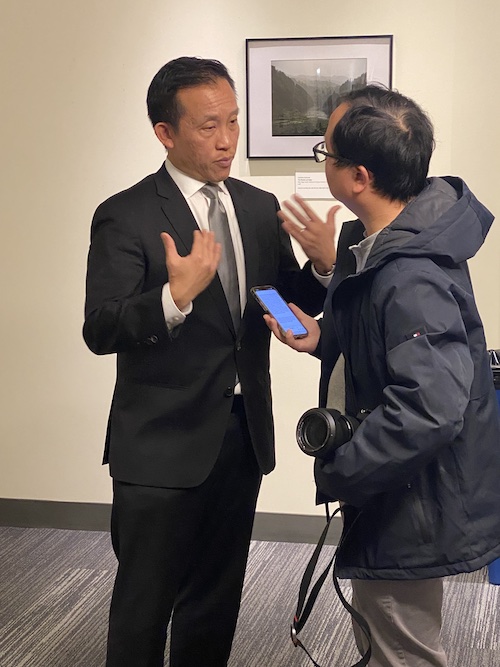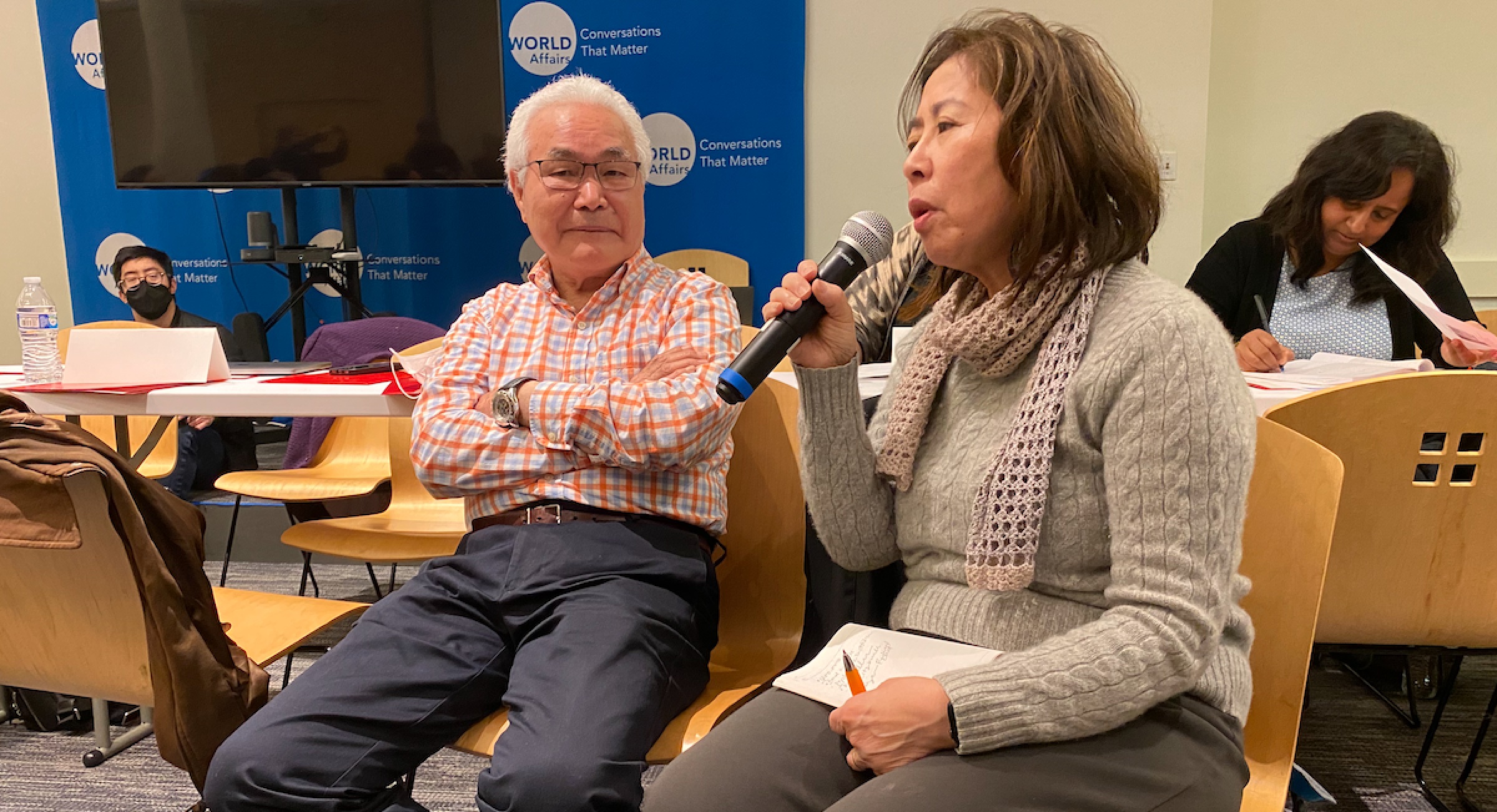Above: Katsumi Iwasaki (L) and Junko Kenmotsu of Asian Pacific Islander Legal Outreach were among attendees at a March 30 briefing in San Francisco looking at scams impacting API communities.
Katsumi Iwasaki is originally from Tokyo but has lived in the Bay Area for more than thirty years. After losing his partner of more than two decades to cancer, the soft-spoken octogenarian went on dating apps at the urging of friends to cope with the loneliness.
That decision would ultimately lead him into the perilous world of romance scams, costing Iwasaki both his life savings – totaling more than $400,000 – and “my love.”
“I trusted him, because he was an Army officer, and because he was good looking,” recalls Iwasaki, chuckling slightly at the memory. Today he lives month-to-month on a meager budget. “Be careful out there,” he says, in reference to the growing minefield of scams and scam artists that in 2022 alone cost consumers $8.8 billion.
Iwasaki shared his experience during a March 30 forum on scams targeting API communities organized by the Federal Trade Commission to raise public awareness and encourage people to report when they’ve been scammed.
His was among a litany of cases discussed during the gathering, which was hosted by the FTC’s Western Regional Office in San Francisco and included representatives from federal and local agencies, community stakeholders, and ethnic media.
Community engagement key
“Scammers are everywhere… they’re not just on the phone anymore. They’re in the mail, they’re in advertising, they’re online,” said Rosario Mendez, an attorney with the FTC’s Division of Consumer and Business Education Bureau of Consumer Protection based in Washington DC, who opened the briefing. She noted the record amount consumers lost last year – over $8 billion. “It’s more than we’ve ever seen,” she said.
Mendez’ office has undertaken a series of nationwide listening tours to meet with local communities and to hear directly from them about the types of scams they’re encountering. The FTC can and does prosecute fraud cases, but its effectiveness depends on what it learns from the public, Mendez said.
She shared a story from a recent session in Louisville, Kentucky where a Korean reporter described a scam that one community member had fallen victim to. The FTC used that information to put out an alert in Korean that was then run across nearly two dozen Korean media outlets.
“The ripple effect is very real,” she said, highlighting the role community engagement with her agency plays in helping to staunch the bleeding.

Making it easier to report scams
“This is the first convening of this type in the state with the API community,” said San Francisco City Attorney David Chiu in his opening remarks, calling the city the “capital” of the nation’s Asian American community when it comes to “deciding how our community is taken care of.”
Chiu’s office recently opened a hotline for residents to report potential scams. The portal is available in English, Spanish, Chinese and Tagalog. According to Chiu, the hotline’s launch came in response to the “flood” of reports his office has fielded about scams targeting largely immigrant and minority populations.
“We want to make it easy for residents in San Francisco and across California to report to us,” explained Chiu, noting the sense of shame and powerlessness that can come in the wake of being scammed often prevents victims from coming forward. “You feel stupid… like it’s your fault. We need to overcome that.”
Tip of the iceberg
Romance scams like the one Iwasaki fell prey to are just the tip of the iceberg. Speakers recounted dozens of scams they’ve encountered, from shady travel agencies with hidden fees to unscrupulous immigration services that can leave victims in jeopardy of being deported. Equity and home improvement scams are a particular issue in the API community and can leave especially older homeowners underwater or force the sale of their home.
Scammers operate both domestically within the US and increasingly abroad. The rise of artificial intelligence also poses additional challenges on the near horizon, as scammers are turning to the emerging technology to perpetrate more sophisticated scams. Chiu called that potential “frightening.”
Renee Coe is a third-year law student at UC Berkeley and is currently working with the non-profit Bay Area legal Aid on a two-year research project looking into how scams are impacting immigrant communities. She shared the story of one Indian student studying in the US who lost $18,000 to a fraudster claiming to be with ICE.

“One thing that scammers do is they emphasize the urgency of the situation so much that you don’t have time to reach out to friends or family” before it’s too late, said Coe, noting the victim in this case was only able to recover $700 of the total amount she lost.
This story “highlights some of the challenges with recovery from scams, and also some of the areas where our laws could be more protected,” Coe explained, noting victims have just 10 days to report unauthorized withdrawals from banks, during which time banks are required to investigate or be liable for losses.
Investment scams, particularly those involving crypto currencies, have ballooned in recent years. Maeve Elise Brown is the Executive Director of Housing and Economic Right Advocates (HERA) based on Oakland. She recalled a friend whose losses totaled in the six figures, and who lost even more after an agency approached him claiming to be able to retrieve his money. Brown believes both instances involved the same entity.
Vindicating the rights of victims
“Don’t be afraid to make a fool of yourself,” said Brown, echoing Chiu and the other speakers about the importance of coming forward. “We’re both sad and happy to learn about new scams. Sad that people are being scammed, and happy for having learned about it.”
Iwasaki eventually did come forward, sharing his story with the organization Asian Pacific Islander Legal Outreach, which has brought his case to litigation. Iwasaki says he’s now preparing to go to court and is hopeful that he will see some – if not all – of his money returned.
“Don’t feel this is your fault,” stressed Chiu. “Part of why we’re here today is to say, no it’s not your fault. You are a victim of a fraud. You need to have your rights vindicated. And if you need justice done, we are the agencies that are looking to do that justice.”
He added, “So we encourage you to reach out to us.”





